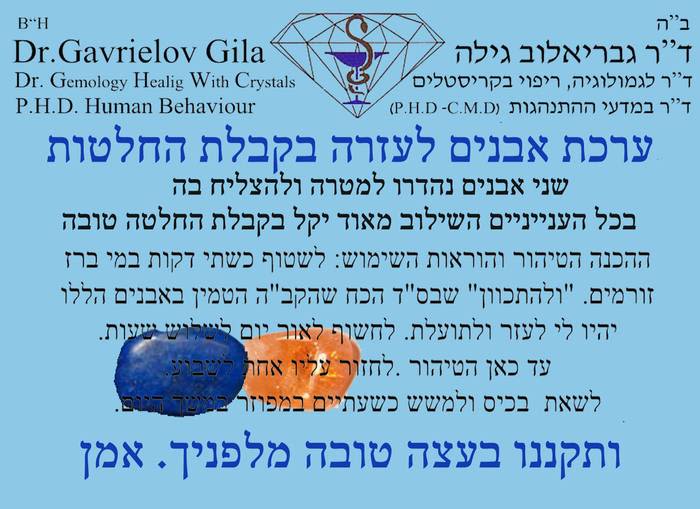
The Song That Transformed Amalek
Purim in Mezhibuzh, the home of the Baal Shem Tov, was unlike Purim anywhere else. And this Purim, a beautiful song was heard...

Purim in Mezhibuzh, the home of the Baal Shem Tov, was unlike Purim anywhere else. Thousands of people came from both near and far and it wasn't just the vast quantities of food and drink that attracted these huge crowds. Throughout the day Torah flowed from the lips of the Baal Shem Tov like water gushing from a pure stream, and his words warmed the hearts of his followers like the finest wine.
A favorite topic for discourse was, of course, Haman – the villain of the Purim story – and his ancestor Amalek, the eternal enemy of the Jewish people. But the Baal Shem Tov wasn't interested in just giving over a history lesson.
"Amalek is still alive today," the Baal Shem Tov warned his chassidim. "Every time you experience a worry or doubt about how God is running the world – that's Amalek launching an attack against your soul. We must wipe Amalek out of our hearts whenever – and wherever – he attacks so that we can serve God with complete joy."
With that the Baal Shem Tov descended into the crowd and began to peer into the eager faces of his followers. At last he came to a small boy, the son of Rabbi Meir Margolis of Lemberg. The Baal Shem Tov took the boy by the hand and led him up to the raised platform in the center of the crowd.
"Shaul, sing to the chassidim," the Baal Shem Tov cheerfully commanded. "Show them how to serve God with a pure heart and complete joy."
The child, who had a very sweet voice, was eager to please the tzaddik. Since it was Purim, he began to sing the song "Shoshanot Yaakov," which is sung after the reading of the Megillat Esther. As the boy sang, one by one the chassidim began to close their eyes and let their souls be carried by the beautiful melody. Buoyed by the words and their promise of salvation, the hearts of the chassidim became filled with a great joy.
Finally the child came to the end of the song, and the crowd reluctantly let themselves be carried back to this world. Yet even the Baal Shem Tov was reluctant to let this child go. When Purim came to an end, he asked the boy's father to let the child remain in Mezhibuzh for Shabbat.
Reb Meir was honored that the Baal Shem Tov had taken a liking to his son. He was also sure there must be some deeper meaning to the tzaddik's request. Yet even so, the child was not yet five years old and so the father was concerned that the child might become frightened at being left alone with strangers.
"Please don't worry, Tatti," the boy reassured his father. "I want to stay here for Shabbat. I promise that even if I get lonely, I won't cry."
That Shabbat passed pleasantly, although the chassidim secretly wondered what was behind their rebbe's request. The Baal Shem Tov sat with little Shaul and learned Torah with him, and Shaul sang a song at each of the meals. But if there was some deeper mystery going on, they could not see it.
After Shabbat the Baal Shem Tov called for two of his favorite students and the small group personally escorted Shaul back to Lemberg. The carriage swiftly flew over the snow-covered roads and the travelers, as usual, were making excellent time.
When the horses followed a bend in the road the travelers suddenly saw – and heard – signs of life ahead. They were fast approaching a small inn, from which could be heard the sounds of drunken singing and laughter.
"Stop the carriage," the Baal Shem Tov called out to his driver.
The two followers of the Baal Shem Tov were surprised – and not surprised – by the Rebbe's behavior. To the outward eye there was nothing unusual about the inn and therefore no reason why they should stop. On the other hand, they knew that nothing was ever as it seemed when they traveled with the Baal Shem Tov.
The Baal Shem Tov took Shaul by the hand and strode into the inn, followed by the two chassidim. The drunken peasants, who continued with their boisterous singing, took no notice of the newcomers. The Baal Shem Tov carefully surveyed the scene for a few moments. Then he loudly clapped his hands and called out, "Silence!"
The group was so startled by this unexpected interruption that they instinctively obeyed.
"Do you want to hear real singing?" the Baal Shem Tov thundered. "Listen to this boy sing. Then you'll know what real singing is."
The Baal Shem Tov called out to Shaul to begin singing "Shoshanot Yaakov." The boy immediately complied, even though he wasn't sure why he had to sing his beautiful song in front of all these drunken peasants. But small as he was, Shaul trusted the Baal Shem Tov implicitly and tried to fulfill the tzaddik's command to the utmost of his ability.
The boy concentrated all his thoughts on the words and melody. He sang more beautifully than he had ever sung before in his life and even in these unlikely quarters his efforts did not go unappreciated. Despite their drunken state, the peasants were visibly moved by the child's singing and they listened in respectful silence until he came to the last note of his song.
The Baal Shem Tov then motioned for three young boys, who had been playing in a corner of the inn, to come forward.
"What is your name?" the Baal Shem Tov asked one of them.
"Ivan," the lad replied.
"And yours?" the Baal Shem Tov asked the second one.
"Stefan," the boy said.
"And you, my child, what is your name?" the Baal Shem Tov said to the third boy.
"Anton," the lad replied.
"Children, I want you to meet my friend," the Baal Shem Tov said, as he brought Shaul forward. 'This is Shaul. Did you like his singing?"
"Oh, yes," the peasant boys happily exclaimed.
"Do you like Shaul?" the Baal Shem Tov continued.
"Yes," the boys replied.
"Good, I'm glad you like my friend," said the Baal Shem Tov. "But please promise me one thing. Promise me that you will always like my friend Shaul, and that you will always be nice to him."
The peasant boys promised to do as the Baal Shem Tov said. Then without further more ado, the Baal Shem Tov signaled for his group to depart.
The chassidim and Shaul quickly climbed back into the carriage. The Baal Shem Tov called out to his driver to drive straight to Lemberg and the journey continued without further interruption.
Many years passed, and the incident was forgotten.
Shaul, who was now a noted scholar and a successful businessman, was again traveling down a snow-covered road, but his thoughts were very far from singing songs. Due to business concerns he had been forced to travel on the Fast of Esther that occurs the day before Purim and now he was in a hurry to get home in time for the Megilla reading.
Besides his concerns about being home in time to perform the mitzva, there were other concerns, as well. The shadows were quickly lengthening and a dangerous patch of forest lay between him and his town. Since this forest was a favorite spot for bandits, Shaul urged his horse to gallop even more quickly. But his efforts to reach home were not successful. When he was about halfway through the forest, his carriage was suddenly forced to a halt.
A bandit leapt down from a tree and skillfully grabbed on to the reins of the horse. At the same time, two other bandits rushed toward the carriage and motioned for Shaul to get out. Since Shaul could see that the bandits were armed with long, sharp knives, he had no choice but to obey.
The bandits had no trouble finding the bag of money that was sitting on the carriage floor. And Shaul had no doubt as to what was going to happen next. Bandits never let their prey escape alive. Since he knew he had only a few more moments left on this earth, Shaul pleaded with the bandits to at least let him say the Vidui prayer, the final confession, so that he could return his soul to his Maker in peace.
"Pray all you want," the leader of the gang insolently replied, "but it won't help you."
While the bandits divided up the gold coins, Shaul tearfully made his final accounting with his Creator. When he was done he allowed himself to think, one last time, of his family, who were waiting for him. By now the townsfolk would be making their way to synagogue to hear the reading of the Megilla. Surely his wife and children would be searching for him in the crowd.
Shaul's heart became lighter as he envisioned the joyous scene inside the synagogue. Then for some reason his thoughts took him back to a Purim that had taken place many years ago. He was once again in Mezhibuzh, standing in the midst of a throng of people with his father. In his mind's eye he could see the Baal Shem Tov standing before him just as clearly as the tzaddik had stood before him on that day. And from across the distance of years, Shaul could hear the Baal Shem Tov speaking once more.
"Amalek is still alive today," the Baal Shem Tov was saying to the crowd. "Every time you experience a worry or doubt about how God is running the world – that's Amalek launching an attack against your soul. We must wipe Amalek out of our hearts whenever – and wherever – he attacks so that we can serve God with complete joy."
Tears welled up in Shaul's eyes as he thought back on that happy day.
"If I cannot perform the mitzva of reading the Megilla this Purim," he whispered to himself, "at least I can accept God's decree with a joyful heart."
And with those words, Shaul began to sing. He sang the song "Shoshanot Yaakov" just as he had sang it so many years before – with total concentration and with a feeling of great joy.
When he finished, Shaul noticed that the three bandits had left off counting the gold coins and were now staring at him with their mouths open wide. As he gazed upon the threesome, it suddenly occurred to him that this was not the first time he had met them.
"You're Ivan, aren't you?" Shaul called out to the leader. "And you, you're Stefan. So of course you must be Anton."
The three bandits nodded their heads and the fierce look in their eyes was quickly replaced by one of friendliness.
"Shaul, please forgive us," Ivan said tearfully. "We didn't know it was you."
The bandits gave Shaul back his money and they insisted on accompanying their friend to the edge of the forest. As they were full of wonder about this amazing "coincidence," Shaul told the men all about the Baal Shem Tov and the many miracles he had performed. The bandits were so overwhelmed by what they heard that they agreed to give up their "profession" and find an honest way to earn their daily bread. And Shaul, for his part, had a Purim unlike any he had ever had before.
***
Libi Astaire is the author of Choose Light! Chassidic Tales for Chanukah, Rosh Hashanah, Sukkos, Passover & Shavuos; Breakfast with Rav Zusha and Other Stories to Wake Up Your Soul; and the award-winning Jewish Regency Mystery Series. Visit her website for more information about these and other books.












3/11/2020
What a beautiful & incredibly moving story. Halevai we would all relate to Hashem with the same innocent, pure-hearted trust these chassidim related to the holy Baal Shem Tov. Thank your sharing such an inspiring story.